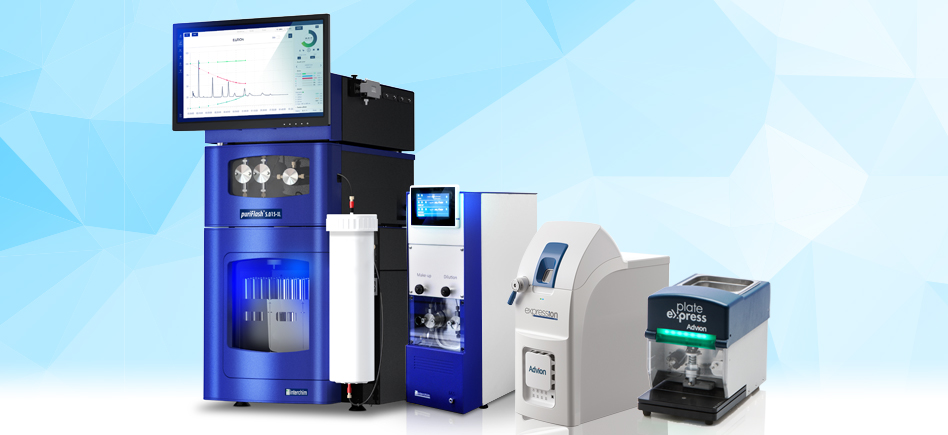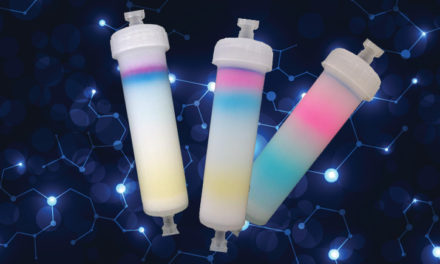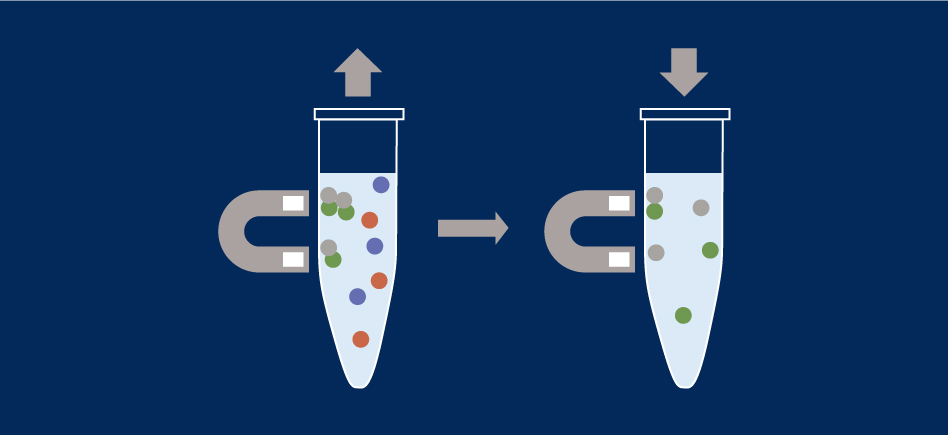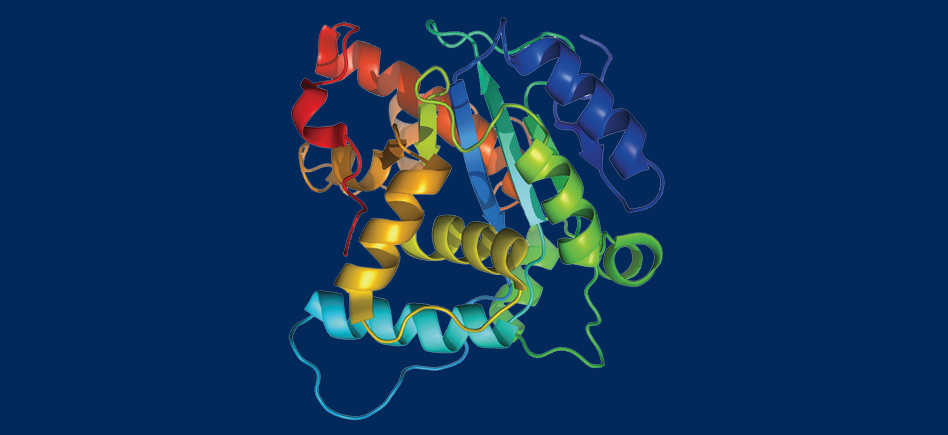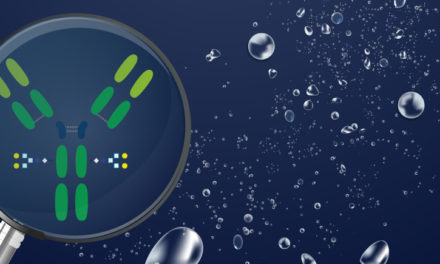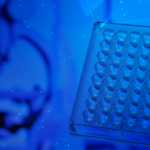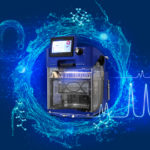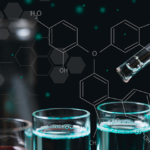Introduction
The compound synthesis, purification and confirmation process often presents challenges throughout. From ensuring successful synthesis of your product, setting up a flash purification method, and finally confirming ID of fractions, the lengthy work flow can be time consuming and repetitive.
This application note demonstrates a new work flow that offers seamless steps to quickly and easily drive the process from reaction monitoring to flash purification and fraction ID.
The three steps that will be highlighted include:
- Step 1: Performing a Suzuki Reaction followed by push-button TLC/CMS analysis with the Advion Plate Express TLC Plate Reader and expression CMS.
- Step 2: TLC to Flash – Purifying the compound using the Interchim puriFlash® XS520 Flash Chromatography Genius® system using a method auto-developed from a cell phone image of your TLC plate.
- Step 3: Fraction ID in <30 seconds with the ASAP probe paired with the expression CMS.
Experimental setup
Mass Spectrometer & Sampling Techniques:
Advion expression CMS
Plate Express TLC Plate Reader
Atmospheric Solids Analysis Probe (ASAP)
Flash System:
Interchim® puriFlash® XS 520
Sample Mixture:
See figure 1
Solvents:
Cyclohexane, 10%
Dichloromethane, 90%
Quantity to purify:
400mg
Step 1: Reaction monitoring using TLC
The reaction of Bromoaniline and Phenylboronic acid in ethanol using a palladium catalyst (Figure 1) takes places over a 2-hour period at room temperature. After 2 hours, an aliquot is taken and spotted on a silica TLC plate and developed in Dichloromethane and Cyclohexane solvents.

| Chemical | MW | Amount for Reaction |
| Bromoaniline | 171 | 855mg |
| Phenylboronic Acid | 122 | 610mg |
| Sodiumchloride | 40 | 260mg |
| Paladiumchloride | 176 | 35mg |
| Ethanol | 8mL | |
| Water | 2mL | |
| P-Amino-Biphenyl | 169 | Theoretical: 845mg (5mmol) |
Figure 1. The sample mixture including molecular weight, structure and reaction amounts.
The reaction is then monitored by TLC/CMS – the Plate Express coupled to the expression Compact Mass Spectrometer for push-button MS analysis of the TLC plate (Figure 2). The system identifies spots unambiguously by taking a mass spectrum directly from the TLC plate (Figure 3).

Figure 2. With the Plate Express TLC plate reader, place the developed TLC and align your spot of interest. At the push of a button, the head lowers and extracts the sample with a solvent to send directly to the mass spectrometer.


Figure 3.
Spot 1: The TLC data clearly shows the typical isotopic doublet at an m/z of 172 and 173, the M+H of Bromoaniline, the unreacted starting material.
Spot 2: A MS signal at m/z 170 indicating the desired reaction productp-NH2-Biphenyl.
Step 2: TLC to flash: purifying our compound
The TLC separation information will now be used to intelligently program the Interchim puriFlash system directly from the TLC plate image to give optimal separation for fraction collection. Now that the product is confirmed using the Advion Plate Express, it is prepared for purification using the Interchim® puriFlash® XS520. We begin the process by executing an app-the TLC to Flash Converter (Figure 4), giving us the power to purify our compound using our cell phone or tablet.
To do so, the TLC plate is photographed. A title or identification details are entered, the solvent front and product of interest, how much to purify (400mg) and the solvents used (Cyclohexane, 10% and Dichloromethane, 90%). The data is then wirelessly sent to the puriFlash system where the Genius software assists in building the remainder of the method (Figure 5).

Figure 4. With the TLC to Flash app, take a picture of the TLC plate. The compounds will be detected automatically. Select the ones of interest with a tap. The application calculates Rf and ΔCV. Finally, indicate the solvents, their proportions and your comments in the dedicated areas and send to the puriFlash®.

Figure 5. Les données CCM apparaissent sur le logiciel Intersoft X. Genius l’intelligence embarquée vous suggère la meilleure méthode de purification en fonction de vos données CCM.
The screen shows the total UV profile after the run (Figure 6), and using the touch-screen functionality you can find where in the fractions the peaks are located for fraction confirmation analysis in the next step.

Figure 6. La plaque CCM et le profil UV post run.
Étape 3 : Identification des fractions en moins de 30 secondes avec l’ASAP/CMS
Flash fractions are located from their UV profile. They need to be confirmed to ensure they have eluted as expected.
We take the central fraction for each compound and analyze them by ASAP/ CMS (Figure 7).

Figure 7. The Atmospheric Solids Analysis Probe (ASAP) is dipped in to one of the identified fraction tubes and inserted in to the mass spectrometer, where is it instantly analyzed by the APCI ion source.
In this fraction (Figure 8) you can again see and confirm using ASAP the signal at m/z 170 indicating the desired reaction productp-NH2-Biphenyl, which is exactly what we expected.

Figure 8: The data from the run quickly and easily identifies 170 m/z, which is exactly what was expected.
The ASAP sampling technique for the expression Compact Mass Spectrometer is the final step to confirm fractions in seconds by simply dipping the probe in the preidentified tube, and inserting it directly in to the mass spec.
Summary
This application work featuring the Advion expression CMS, the Plate Express and ASAP sample techniques, and the Interchim puriFlash flash chromatography system offers easy sampling techniques, intuitive software, and advanced detection technology. Using this streamlined workflow you can easily and confidently synthesize, characterize and purify your compound. The intuitive work flow ensures that:
- The correct TLC spot is identified for purification using the Plate Express and expression CMS.
- An optimized Flash method is recommended and programmed using the Interchim® puriFlash® XS520
and Genius software - Flash fractions are identified with the ASAP dipping probe and expression CMS
Know more:
- See our live videos on our Youtube channel.
- Download and install the app TLC to Flash & Prep Chromatography.
- Consult our products:
– puriFlash® purification systems
– Expression CMS
– Plate Express
– ASAP® (Atmospheric Solids Analysis Probe) - Do not hesitate to ask for technical information or your personalized offer

